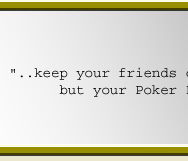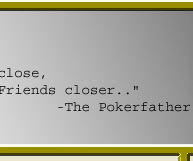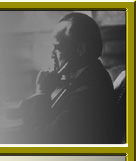(Click Here for the Latest Online Poker News Stories)
Copyright 2005 Rockford Register Star.
December 19, 2005
HEADLINE:
Charities capitalize on poker boom
Author: ISAAC GUERRERO
Body:
ROCKFORD — Poker is the new bingo.
At least, that’s how a growing number of charities in the
Rock River Valley feel.
Just ask John Guth, director of Ken-Rock Community Center. Like
many other nonprofit groups, Ken-Rock has watched charitable donations
dry up in recent years. Budget shortfalls have forced the neighborhood
center to lay off two full-time employees since 2002. And revenue
from weekly bingo games is slipping.
So Guth organized a Texas
Hold ’Em tournament in March that offered as the grand
prize a seat at the World Series of Poker in Las Vegas. The fundraiser
was a smashing success. In a single afternoon, Ken-Rock earned
a $15,000 profit — about half of what the 11th Street community
center earns in an entire year from hosting weekly bingo games.
“Financially, bingo is a dog with fleas,” Guth said.
“These poker tournaments are much easier to orright, you
can earn $10,000 or $15,000 in one shot.”
Spurred by televised poker
tournaments, the Texas
Hold ’Em craze is sweeping the nation and has planted
its roots in the Rock River Valley. Groups including the Rockford
Lions Club and Hoo Haven, a Durand wildlife refuge, are staging
casino nights and poker tournaments to simply exist, and sometimes
expand.
“We probably have 30 charities around town that are doing
this right now, and each one is hosting up to four events a year,”
said Jim Kasputis, owner of Rockford Charitable Games, a private
company that charges nonprofit groups a fee to organize casino
nights and poker tournaments.
Poker also is attracting new faces to places like Ken-Rock and
Harlem Community Center in Machesney Park, another nonprofit group
that’s jumping on the gambling bandwagon. While bingo nights
at Ken-Rock tend to draw folks from nearby, a Texas Hold ’Em
tournament at HCC last Sunday drew more than 100 players from
Rockford, downstate and the Chicago suburbs.
Poker is more profitable,
too.
Ken-Rock charges $1 a bingo card during its regular Monday and
Saturday night games. Special bingo games and raffles cost more.
The average Ken-Rock player will spend $25 to $30 a night on bingo,
food and drink, raffles and pull tabs, Guth said. By contrast,
the average poker player spends nearly $100 when they visit Ken-Rock
for a Texas Hold ’Em tournament. The last tournament cost
$55 to enter, and players were allowed to buy an additional $30
worth of chips.
“This is the closest thing to going to Vegas and playing
in a poker tournament,” said Larry Bock, a 53-year-old poker
player from Algonquin who bought a seat in the HCC tournament
last Sunday for $65.
“I’ve been to the riverboat casinos, and the action
here is a lot better than that,” he said. “There’s
a lot of good players who come to these tournaments. I travel
around and play as much as I can — maybe three or four times
a month.”
The poker scene at HCC was in stark contrast to a Monday night
bingo game at Ken-Rock two weeks earlier. The smoky Ken-Rock gymnasium
was only half-full of bingo players who paid $1 a card hoping
to win prizes up to $250. The crowd kept quiet as Guth read aloud
the numbers over a crackly PA system.
“We’ve been coming here for probably 10 or 15 years,”
said Eddie White, 54, as his wife clutched an ink blotter and
scanned a half-dozen bingo cards spread out on the table in front
of them.
“I play because it relaxes me,” White said. “Most
of the people you see come every week. A lot of people know each
other. They’re regulars.”
Bingo has its fans, but economically, it’s waning.
Illinois issued 1,384 bingo licenses to charities in 1993, but
only 811 in 2003, according to the Illinois Department of Revenue,
which licenses and taxes charities that host bingo games. Tax
revenue from those games dropped 43 percent from $7.8 million
to $4.4 million during the same time.
“It used to be that every charity in town had a dinner
dance fundraiser, so you had to stop doing the dinner dance and
you did bingo games,” said Director Shannon Scheffel HCC.
“Then everybody was doing bingo, and now it’s not
as profitable as it used to be. We stopped doing bingo last summer.
The money we made just wasn’t worth the time and effort
it takes to organize the games every week.”
HCC needed an army of volunteers to organize and run bingo games
52 weeks a year to earn about $30,000, Scheffel said. By contrast,
poker requires fewer volunteers, and the returns are much larger.
HCC earned about a $5,000 profit the first time it held a Texas
Hold ’Em tournament in September. Last week’s tournament
should net closer to $10,000 once the numbers are tallied, Scheffel
said.
How long poker tournaments
will stay hot is unclear, said Mike Nilsen, public affairs director
for the Alexandria, Va.-based Association of Fundraising Professionals.
“It’s probably too early to say, but I think poker
has some staying power,” Nilsen said. “Bingo is largely
played by an older generation, while poker appeals to younger
people and to all generations. Bingo is just luck, but with poker
there’s some skill involved, so it tends to keep your interest.
From that perspective, poker’s probably got a significant
amount of staying power.”
While there’s no limit to how many charitable bingo games
a nonprofit group can host, state law limits charities to four
casino nights or poker tournaments a year. Cash prizes at a charitable
poker contest cannot exceed $250, but charities find ways to get
around that rule. Ken-Rock gave away a seat at the World Poker
Tour tournament in Las Vegas when the community center held its
Texas Hold ’Em contest in September. At HCC’s last
poker tourney, the grand prize was a $7,500 VISA debit card.
Scheffel’s betting that HCC could host four poker tournaments
a year and reap $40,000, enough to pay a full-time employee’s
salary and benefits.
“It’s stressful to be worrying about funding all
the time,” Scheffel said. “I’m a social worker.
I can’t imagine what my alma mater would think if they knew
I was using my master’s degree to organize poker tournaments.
But the bills aren’t going to pay themselves.”
Many local nonprofits rely heavily on charitable games. Rockford’s
Center For Sight and Hearing has a $1 million annual budget to
help people with hearing and vision loss live independent lives.
A third of that budget comes from bingo and casino nights, said
Diane Jones, the agency’s president.
“Our bingo revenue has fallen,” Jones said. “It
hasn’t been a drastic decline, but it’s been enough
that we can feel it. We’ve already started doing the casino
nights, and we’re constantly looking for new revenue streams.
“The demographic of a bingo player versus that of a Texas
Hold ’Em player is like night and day,” Jones said.
“They’re an entirely different animal in terms of
their disposable income. The poker players are willing to spend
more.”
In a perfect world, Jones said her organization wouldn’t
have to rely so much on gambling. But many of the manufacturing
companies and corporations have left Rockford, and donations to
local charities tend to drop off when you have natural disasters
like Hurricane Katrina or 9-11, she said.
Establishing a private endowment can reduce a charity’s
reliance on gambling income while providing stable, permanent
income, said Gloria Lundin, director of northern Illinois Community
Foundation, a nonprofit foundation that manages endowments for
other charities.
“I look at poker and bingo as a kind of temporary fix,”
Lundin said. “An endowment can provide a long-term funding
solution, and you don’t need $1 million to start one. You
can start with just $50,000 or $75,000, and it will continue to
grow.”
But setting aside as little as $50,000 for an endowment can be
tough for a small charity that struggles to pay its bills, Guth
said.
“It’s kind of sad that it’s come to this,”
Guth said. “We’re here to provide education and recreation
programs for youths and adults, and we spend a lot of time trying
to figure out how we’re going to pay the next gas bill.
Some weeks I spend 20 hours or more planning these charitable
games. Something’s wrong with that picture, wouldn’t
you say?”
Contact: iguerrero@rrstar.com; 815-987-1371
Downloaded
from the World Wide Web on December 18, 2005:
http://www.rrstar.com/apps/pbcs.dll/
article?AID=/20051218/NEWS0107/112180015 |
(Click Here for the Latest Online Poker News Stories)
|







